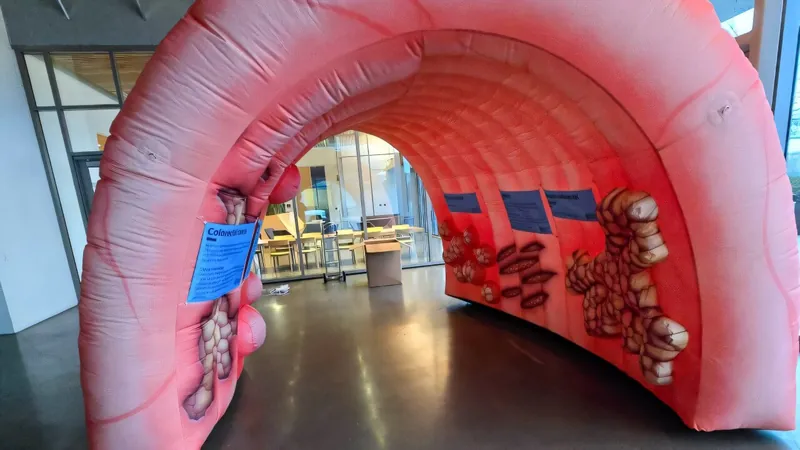
Breakthrough Clinical Trial Significantly Boosts Colorectal Cancer Screening in Rural Communities!
2025-03-17
Author: Mei
Groundbreaking Study Overview
A groundbreaking study has revealed that a strategic combination of mailed stool-based tests and personalized patient navigation can dramatically enhance colorectal cancer (CRC) screening rates among Medicaid enrollees in rural regions. Research led by Oregon Health & Science University (OHSU) in collaboration with the Kaiser Permanente Center for Health Research has made significant strides in addressing the long-standing challenge of low CRC screening participation in rural healthcare settings.
The Importance of CRC Screening in Rural Areas
With around 60 million adults residing in rural areas of the United States, the lack of adequate CRC screening—particularly among those on Medicaid—has become an urgent public health concern. Early detection through screening is vital for effective treatment and prevention of colorectal cancer. This study was designed to tackle these issues by utilizing mailed fecal immunochemical tests (FIT kits) and offering patient navigation assistance to facilitate follow-up colonoscopies when required.
Expert Insights and Clinical Trial Details
Dr. Melinda Davis, a key author of the study, emphasized the disparity faced by rural populations in accessing effective treatments. "Effective treatments can be slow to reach rural populations," she stated. "This research helps bridge this gap to ensure all patients receive high-quality care, whether they live in rural or urban areas."
Staggering Results of the Clinical Trial
The clinical trial involved 5,614 Medicaid enrollees aged between 50 and 75, splitting participants into two groups: one receiving the innovative intervention, and the other following standard care without enhancements. The results were staggering—11.8% of those in the intervention group completed CRC screening within a six-month period, compared to a mere 4.5% in the usual care group. For those with abnormal FIT results, the follow-up colonoscopy completion rate soared to 43.3% in the intervention group versus just 15.4% in the standard care group.
Barriers Faced by Rural Populations
Gloria Coronado, Ph.D., co-lead of the trial and an associate director with the University of Arizona Cancer Center, highlighted the barriers faced in rural settings. "Individuals who live in rural regions often encounter additional challenges when seeking cancer screenings," she explained. Partnering with Medicaid health plans provided centralized resources crucial for promoting CRC screenings efficiently.
Positive Impact on Rural Health
Jennifer Coury, M.S., a senior research project manager at ORPRN, expressed her satisfaction with the project's positive impact on rural health. "The most rewarding part of this research study was improving the health of rural populations through collaboration with local clinics."
Room for Improvement
The study's implementation showed great promise, with nearly all eligible participants receiving their FIT kits and timely notifications. However, there remains room for improvement, as only about 58% of those needing follow-up colonoscopies were successfully navigated through the process.
Significance of the Findings
Dr. Davis reiterated the significance of their findings, stating, "Implementing mailed FIT outreach and patient navigation improves screening, which saves lives from colorectal cancer, the second leading cause of cancer death in the U.S."
Future Directions in Research
This research highlights the essential role of continued national investments in biomedical research focused on rural health disparities. Future efforts are likely to aim at engaging populations without primary care providers since these individuals are less inclined to participate in essential preventive screenings. The successful results of this clinical trial add to a growing wealth of evidence affirming the effectiveness of proactive outreach in communities previously underserved in cancer screening.
Conclusion
Stay tuned for further developments as this research paves the way toward a healthier future for rural Americans!




 Brasil (PT)
Brasil (PT)
 Canada (EN)
Canada (EN)
 Chile (ES)
Chile (ES)
 Česko (CS)
Česko (CS)
 대한민국 (KO)
대한민국 (KO)
 España (ES)
España (ES)
 France (FR)
France (FR)
 Hong Kong (EN)
Hong Kong (EN)
 Italia (IT)
Italia (IT)
 日本 (JA)
日本 (JA)
 Magyarország (HU)
Magyarország (HU)
 Norge (NO)
Norge (NO)
 Polska (PL)
Polska (PL)
 Schweiz (DE)
Schweiz (DE)
 Singapore (EN)
Singapore (EN)
 Sverige (SV)
Sverige (SV)
 Suomi (FI)
Suomi (FI)
 Türkiye (TR)
Türkiye (TR)
 الإمارات العربية المتحدة (AR)
الإمارات العربية المتحدة (AR)